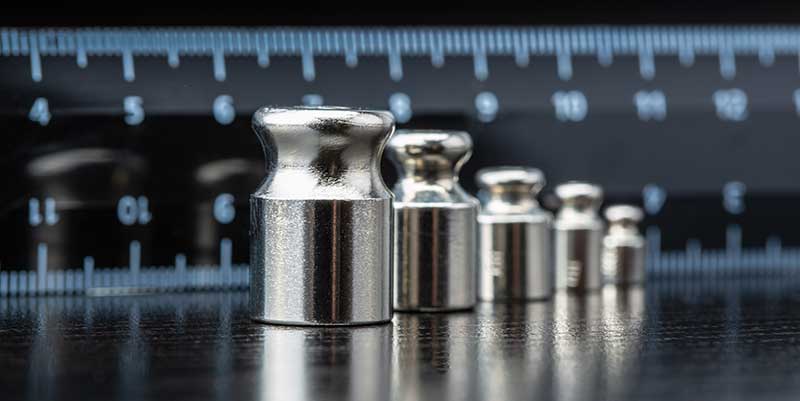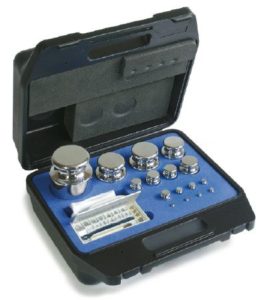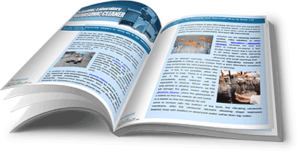
Selecting Scale Weights for Calibration Testing
Calibrating precision digital scales, analytical balances and moisture analyzers that rely on accurate weight measurement requires periodic tests using a scale weight closely matching the maximum capacity of the instrument being tested.
Why Testing with Scale Weights is Important

Daily we depend on weighing accuracy – such as visits to the deli counter in the supermarket. We want assurance that the weight shown on the scale is accurate. The U.S. Government’s Weights and Measures Division sets the guidelines.
But in research labs and in food, drug and other production facilities, weighing accuracy assumes a highly critical criterion. This applies to weighing and measuring instruments where readout (the smallest weight difference displayed) and linearity (the ± deviation from the actual weight) are governed by GLP, ISO and other standards.
Adding to challenges, the accuracy of precision weighing and measuring instruments can be compromised by changes in location, fluctuations in ambient temperature, use and other factors. These points are covered in our post on weighing accuracy. While it focuses on analytical balances, the importance of calibrating digital scales and moisture analyzers is no less important
This is why testing instruments by using a properly matched scale weight is important. They are required when instruments with capacities from milligrams to tons are not internally calibrated. (The type of calibration, whether internal or external, is indicated on instruments’ spec sheets.)
Selecting Calibration Weights for Digital Scales
As noted above, when using an externally calibrated instrument the calibration weight should be as close as possible to the maximum weight capacity of the scale. Recommended test weights are provided in user manuals.
Once the test weight is specified, the scale weight itself can be selected based on seven International Organization of Legal Metrology (OIML) accuracy classes ranging from E1 to M3, where E1 is the most accurate and M3 the least.
OIML recommendation R111-2004 covers multiple weight ranges from 1 mg to 5,000 kg showing maximum permissible errors (MPE) in terms of ± mg. This increases to ± g as sample weights increase and accuracy decreases.
As an illustration the E2 80 g MPE for a 100 g test weight is ± 0.16 mg. The E1 MPE for this test weight is 0.05 mg; the M3 MPE is ± 50 mg.
Scale Weight Care and Calibration
Calibration test weights, as indicated earlier in this post, are manufactured to exacting conditions because, as noted above, the equipment will never be more accurate than the scale weight used to adjust it. Test scale weights can represent a substantial investment to be protected by proper handling, care and periodic recalibration.
As with the equipment they test, test weights should also be recalibrated as part of ongoing GLP. The frequency of recalibrating test weights depends on the frequency of use, the conditions of use and the security needs of your organization in terms of standards compliance.
Tovatech suggests that scale weights used intensively for testing should be recalibrated at least every six months, otherwise at least once a year. Recalibration is done under strict laboratory conditions. Weights that pass are issued a recalibration certificate detailing the exact conditions under which the recalibration was made.
Sometimes test weights that fail recalibration can be brought back into tolerance limits by repair or remanufacture. Otherwise, they must be replaced.
Usage procedures for test weights should be clearly specified relating to handling and storage.
For example, acids on your hand could cause etching that could invalidate the accuracy of a 1 mg test weight – especially one with a tolerance of ± 0.003 mg.
For this reason gloves should always be used when handling scale test weights. Gloves, along with tweezers and dust brushes are supplied by companies such as Kern as a further means to promote safe handling. Store scale weights in fully lined wooden boxes and milligram weights in plastic boxes.
Precision scale weights for testing can be obtained individually or in multiple-unit sets. Tweezers, gloves, dusting brushes and individual or multiple-unit storage container and carrying cases are also available to maintain and protect these precision test weights. These help organizations meet internal or external guidance procedures supporting precision weighing and measuring requirements.
For additional information please check our post on how to calibrate a digital scale. It covers a lot of useful information including purchasing considerations, equipment protection, and proper use.
Need More Info on Scale Weights for Testing?
Contact the weighing professionals at Tovatech for help in selecting scale weights to calibrating scales, balances and moisture analyzers used in your organization.
